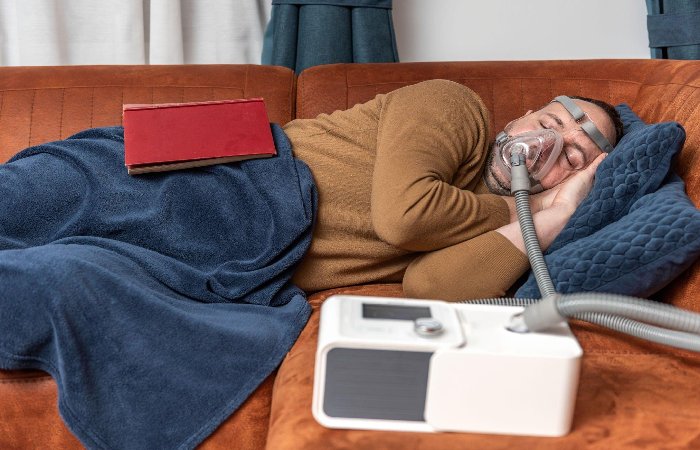Table of Contents
Introduction
Wellhealthorganic.Com:If-You-Are-Troubled-By-Snoring-Then-Know-Home-Remedies-To-Deal-With-Snoring – Snoring is a common problem that disturbs millions of people around the world. It can cause disturbed sleep for both the snorer and their partner, leading to fatigue, irritability, and other health problems. Fortunately, various natural remedies can help reduce or even eliminate snoring.
In this blog, Wellhealthorganic.Com:If-You-Are-Troubled-By-Snoring-Then-Know-Home-Remedies-To-Deal-With-Snoring you will discover a range of practical and easy-to-implement strategies to help you or your loved one get a good night’s sleep. Whether you’re dealing with mild snoring or more severe sleep apnea, this book will provide the information you need to reduce or stop snoring naturally without resorting to expensive medical treatments or invasive procedures.
Understanding the Science of Snoring

Snoring is a communal problem that affects millions of people around the world. It occurs when airflow through the mouth and nose is partially blocked during sleep, causing the tissues in the throat to vibrate and produce a snoring sound.
Various factors, including age, weight, alcohol consumption, smoking, and anatomical abnormalities in the nose and throat, can cause snoring. It can also indicate a more serious situation called sleep apnea, where breathing repeatedly stops and starts during sleep.
Wellhealthorganic.Com:If-You-Are-Troubled-By-Snoring-Then-Know-Home-Remedies-To-Deal-With-Snoring says Snoring can significantly impact sleep quality, leading to daytime fatigue, irritability, and difficulty concentrating. It can also increase the risk of severe health problems like high blood pressure, heart disease, and stroke.
It is essential to understand its underlying causes to reduce or eliminate snoring. Simple lifestyle changes, such as losing weight, leaving smoking, and avoiding alcohol before bedtime, can often help reduce snoring. In more severe cases, medical treatments or devices may be necessary.
Identifying the Causes of Snoring

Snoring is caused by a partial block of the airways during sleep, leading to the vibration of the soft tissues in the mouth and throat. Some factors can give to this obstruction, including age, weight, and anatomical abnormalities in the nose and throat.
As people age, their throat muscles naturally weaken, increasing the likelihood of snoring. Being overweight or obese can also lead to snoring, as excess fat can put pressure on the airways and cause them to narrow. Anatomical abnormalities, such as a deviated septum, enlarged tonsils, or a small jaw, can also contribute to snoring.
Wellhealthorganic.Com:If-You-Are-Troubled-By-Snoring-Then-Know-Home-Remedies-To-Deal-With-Snoring tell Certain lifestyle factors can also contribute to snoring, such as smoking, alcohol consumption, and sedative use. Smoking irritates the lining of the throat and can cause inflammation, while alcohol and sedatives relax the muscles and can lead to snoring.
Identifying the underlying causes of snoring is essential for finding practical solutions. By making lifestyle changes, such as losing weight, quitting smoking, avoiding alcohol before bedtime, and addressing anatomical abnormalities, snoring can often be reduced or eliminated. In more severe cases, medical treatments or devices may be necessary.
The Power of Breathing Exercises For Snoring

Wellhealthorganic.Com:If-You-Are-Troubled-By-Snoring-Then-Know-Home-Remedies-To-Deal-With-Snoring shows that breathing exercises can be a powerful tool in reducing snoring. These exercises are designed to strengthen the muscles in the throat and promote more effective breathing during sleep.
One joint breathing exercise is known as the “didgeridoo” exercise. It involves making a continuous, low-pitched humming sound while breathing in and out through the nose. This exercise can help strengthen the muscles in the throat and improve airflow.
Another exercise involves inhaling deeply through the nose and exhaling forcefully through the mouth, making a “ha” sound. This exercise can help clear the airways and promote more effective breathing.
Yoga and meditation practices can also be beneficial in reducing snoring. These practices focus on deep, slow breathing and relaxation techniques, which can help reduce stress and tension in the body and promote more restful sleep.
Breathing exercises can be a simple and effective way to reduce snoring. Still, working with a qualified healthcare professional is essential to decide the best exercises for your individual needs. In some cases, medical treatments or devices may also be necessary to address snoring.
Other techniques can help improve breathing and reduce snoring. One such method is nasal irrigation, which involves flushing the nasal passages with a saline solution, which can help clear the sinuses and promote more effective breathing.
Another technique is known as the “tongue slide” exercise. This involves sticking the tongue out as far as possible and then sliding it back into the mouth while keeping it in contact with the bottom teeth. This exercise can help strengthen the muscles in the tongue and reduce the likelihood of it falling back and obstructing the airways during sleep.
The Magic of Herbal Remedies for Snoring

Herbal remedies can be a natural and effective way to reduce snoring. Many herbs have properties that can help reduce inflammation, promote relaxation, and improve breathing.
One herb commonly used for snoring is chamomile. Chamomile has anti-inflammatory properties that can help decrease swelling in the throat and promote more effective breathing. Drinking chamomile tea before bed can help support relaxation and improve sleep quality, which can also help reduce snoring.
Another herb commonly used for snoring is peppermint. Peppermint has a cooling and soothing effect that can help reduce inflammation in the throat and promote more effective breathing. Drinking peppermint tea or inhaling essential oil before bed can help reduce snoring.
Wellhealthorganic.Com:If-You-Are-Troubled-By-Snoring-Then-Know-Home-Remedies-To-Deal-With-Snoring says eucalyptus is another herb commonly use for snoring. Eucalyptus has a decongestant effect that can help clear the airways and promote more effective breathing. Inhaling eucalyptus essential oil before bed can help reduce snoring.
Other herbs commonly used for snoring include lavender, valerian root, and lemon balm. These herbs have properties that can help promote relaxation and improve sleep quality, which can also help reduce snoring.
Working with a qualified healthcare professional when using herbal remedies for snoring is essential, as some herbs can interact with medications or have side effects. Additionally, while herbal remedies can effectively reduce snoring, they may not suit everyone.
The Benefits of Essential Oils for Snoring

As per Wellhealthorganic.Com:If-You-Are-Troubled-By-Snoring-Then-Know-Home-Remedies-To-Deal-With-Snoring essential oils can be a usual and effective way to reduce snoring. Many essential oils have properties that can help reduce inflammation, promote relaxation, and improve breathing.
One essential oil commonly used for snoring is lavender. Lavender has calm and relaxing properties that can help reduce stress and promote more restful sleep. Inhaling lavender essential oil before bed can help reduce snoring.
Another essential oil commonly used for snoring is eucalyptus. Eucalyptus has a decongestant effect that can help clear the airways and promote more effective breathing. Inhaling eucalyptus essential oil before bed can help reduce snoring.
Peppermint essential oil is also effective in reducing snoring. Peppermint has a cooling and soothing effect that can help reduce inflammation in the throat and promote more effective breathing. Inhaling peppermint essential oil before bed can help reduce snoring.
Other essential oils commonly used for snoring include thyme, tea tree, and lemon. These essential oils have properties that can help reduce inflammation, promote relaxation, and improve breathing.
Working with a qualified healthcare professional when using essential oils for snoring is necessary, as some essential oils can interact with medications or have side effects. Additionally, while essential oils can effectively reduce snoring, they may not suit everyone.
The Role of Diet in Reducing Snoring

Wellhealthorganic.Com:If-You-Are-Troubled-By-Snoring-Then-Know-Home-Remedies-To-Deal-With-Snoring says diet can play a role in reducing snoring by helping to control weight and reduce inflammation in the body. Here are some dietary variations that can help reduce snoring:
- Reduce or Eliminate Alcohol Consumption: Alcohol can relax the muscles in the throat, leading to snoring. Cutting back on alcohol or reducing it together can help reduce snoring.
- Don’t Take Heavy Meals Before Bedtime: Eating a large, heavy meal before bedtime can lead to indigestion and increase the likelihood of snoring. Try to eat light meals earlier in the evening.
- Increase Intake of Fruits and Vegetables: Fruits and vegetables are rich in antioxidants and anti-inflammatory combinations that can help reduce inflammation in the body and promote better breathing.
- Limit Processed and High-Fat Foods: Processed and high-fat foods can contribute to weight gain, leading to snoring. Try to reduce these foods in your diet.
- Drink Plenty of Water: Staying hydrated can help reduce mucus build-up in the nose and throat, which can contribute to snoring.
It is vital to consult with a healthcare provider or registered dietitian before making significant dietary changes, especially if you have any underlying health conditions. Additionally, while nutritional changes can effectively reduce snoring, they may not be the only solution, and other interventions may be necessary.
The Importance of Sleeping Positions for Snoring

As per Wellhealthorganic.Com:If-You-Are-Troubled-By-Snoring-Then-Know-Home-Remedies-To-Deal-With-Snoring sleeping position can play an essential role in snoring, as it affects the airway and can lead to partial blockage or obstruction. Here are some tips on sleeping positions that can help reduce snoring:
Sleep on your side: Sleeping on your back can cause the tongue and soft tissues in the back of the throat to collapse, leading to snoring. Sleeping on your side can relief keep the airway open and reduce snoring.
Elevate your head: Using a pillow or raising the head of the bed can help reduce snoring by keeping the airway open and reducing the amount of pressure on the throat. Avoid sleeping on your belly. Sleeping on your belly can put pressure on the neck and cause the airway to narrow, leading to snoring.
Use a body pillow: Using a body pillow can help keep you in a side-sleeping position and reduce the likelihood of rolling onto your back.
It is important to note that while a sleeping position can help reduce snoring, it may not be the only solution, and other interventions may be necessary. Consulting with a healthcare provider for a comprehensive evaluation and personalized treatment plan is vital.
Medical Treatments for Snoring

There are several medical treatments available for snoring, depending on the underlying cause and severity of the condition. Here are some examples:
- Continuous Positive Airway Pressure: A CPAP machine delivers a constant airflow through a mask worn over the nose and mouth to keep the airway open during sleep.
- Oral Appliances: A dental appliance can be customize to fit the mouth and help prevent the tongue and soft tissues from blocking the airway during sleep.
- Surgery: Surgery may be an option in cases where snoring is cause by physical abnormalities such as a deviated septum or enlarged tonsils.
- Radiofrequency Tissue Ablation (RFTA): This minimally invasive procedure uses radiofrequency energy to shrink and tighten the tissues in the throat, reducing snoring.
- Injection Snoreplasty: This procedure involves injecting a hardening agent into the soft palate to stiffen the tissues and reduce snoring vibrations.
Devices to Stop Snoring: Do They Work?
There are several devices available on the market that claim to help reduce or eliminate snoring. These devices work by adjusting the position of the jaw, tongue, or soft palate to keep the airway open during sleep. Examples include:
- Mandibular Advancement Devices (MADs): These devices are custom-fit to the mouth and work by moving the lower jaw slightly forward to open the airway.
- Tongue Stabilizing Devices (TSDs): These devices work by holding the tongue in place to prevent it from blocking the airway.
- Nasal Dilators are small plastic or silicone devices inserted into the nostrils to help keep the nasal passages open and reduce snoring.
- Anti-Snoring Pillows: These are design to keep the head and neck in a specific position to help prevent snoring.
While these devices may be effective for some people, they may not work for everyone.
A Holistic Approach to Treating Snoring
A holistic approach to treating snoring involves addressing the underlying causes of snoring. Through lifestyle changes, alternative therapies, and medical treatments. Here are some critical elements of a holistic approach to treating snoring:
- Lifestyle changes: This can include losing weight, avoiding alcohol and sedatives before bedtime, quitting smoking, and improving sleep hygiene.
- Alternative therapies: These can include breathing exercises, yoga, acupuncture, and herbal remedies.
- Medical treatments: This can include Continuous Positive Airway Pressure (CPAP) therapy, oral appliances, and surgery.
- Addressing underlying health conditions: Sleep apnea, allergies, and other medical conditions can contribute to snoring. It is essential to address these underlying health issues to treat snoring effectively.
- Mind-body techniques: Stress and anxiety can affect sleep and contribute to snoring. Mind-body practices such as meditation, mindfulness, and relaxation exercises can help reduce stress and improve sleep quality.
Conclusion for Wellhealthorganic.Com:If-You-Are-Troubled-By-Snoring-Then-Know-Home-Remedies-To-Deal-With-Snoring
Snoring can have a significant impact on sleep quality and overall health. While medical treatments such as CPAP therapy and surgery are available, many effective home remedies for snoring are also available. These remedies can range from lifestyle changes, such as weight loss and improving sleep hygiene. To alternative therapies, such as breathing exercises, yoga, and herbal remedies.
Wellhealthorganic.Com:If-You-Are-Troubled-By-Snoring-Then-Know-Home-Remedies-To-Deal-With-Snoring tell it is essential to take a holistic approach to treat snoring, addressing underlying health conditions, making lifestyle changes, and exploring alternative therapies and medical treatments. By doing so, individuals can improve their sleep quality and reduce the adverse effects of snoring on their overall health and well-being.
